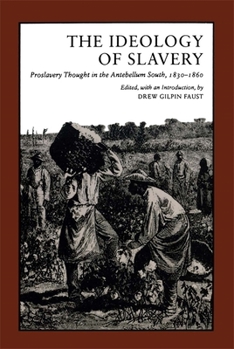Ideology of Slavery: Proslavery Thought in the Antebellum South, 1830--1860
Select Format
Select Condition 
Book Overview
In one volume, these essentially unabridged selections from the works of the proslavery apologists are now conveniently accessible to scholars and students of the antebellum South. The Ideology of Slavery includes excerpts by Thomas R. Dew, founder of a new phase of proslavery militancy; William Harper and James Henry Hammond, representatives of the proslavery mainstream; Thornton Stringfellow, the most prominent biblical defender of the peculiar...
Format:Paperback
Language:English
ISBN:0807108928
ISBN13:9780807108925
Release Date:September 1981
Publisher:LSU Press
Length:320 Pages
Weight:1.06 lbs.
Dimensions:0.7" x 6.2" x 9.0"
Customer Reviews
2 ratings
Antebellum thought
Published by Thriftbooks.com User , 14 years ago
Excellent compilation of intellectual ideas from the antebellum south. As the author makes clear, however repugnant the ideals/beliefs of racism are, it is important to examine them openly. This book allows just that among leading intellectuals at the time.
NOT to Be Read for Pleasure!
Published by Thriftbooks.com User , 16 years ago
The seven essays collected in this book, written by Southerners between 1830 and 1860, are unpalatable pompous nonsense for any modern reader except perhaps a "stars-and-bars" Red State neo-confederate. All seven are self-righteous apologies for slavery, on the basis of the authors' interpretation of the Bible showing that the Negro is accursed and that slavery is God's Will. All seven make similar sociological arguments than slavery is a beneficent institution and a necessary component of a well-ordered society, in which some must always serve as the "mudsill." All seven accuse "fanatics," who ought to be tending to their own class of "wage-slaves," of campaigning to disrupt the idyllic social structure of the South, the new Athens. The authors in question are Thomas Roderick Dew, William Harper, Thornton Stringfellow, James Henry Hammond, Josiah Nott, Henry Hughes, and George Fitzhugh. Historians as a profession sometimes need to comb through some awful trash to glean insights into the course of human events. Southern historian Drew Gilpin Faust (now serving time as President of Harvard University) has assembled and edited these essays, not only to hold them as exhibits of the intransigence with which the antebellum South defended its "peculiar institution," but also because she finds evidence in them of a larger cultural paradigm, of a world-view that depended on hierarchy and class consciousness for meaning, of a set of values based on white supremacy that didn't end with defeat in the rebellion of 1861-1865. She explains her hypothesis in a twenty-page introduction to the anthology. She writes: "In recent years... interpretations of proslavery thought have shifted. Perhaps more accustomed to the notion of a timeless and geographically extensive American racism, scholars have begun to place proslavery within a wider context, to regard it as more than simply a distasteful manifestation of collective paranoia gripping the South in the years before the Civil War. Historians have come to view the proslavery argument less as evidence of moral failure and more a a key to wider patterns of beliefs and values. The defense of human bondage...was perhaps more important as an effort to construct a coherent southern social philosophy than as a political weapon... "The persistence of modern racism is but one forceful reminder of the ways human beings always view the world in terms of inherited systems of belief and explanation that only partially reflect the reality..." Dispassionate language! Historians are rewarded for such. The dire corollary of Dr. Faust's hypothesis is that at least some segments of the American populace needed and still need "white superiority" to maintain the whole structure of their beliefs and values. If so, woe unto us!





